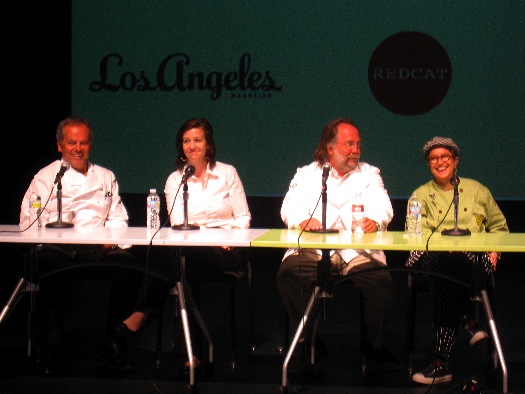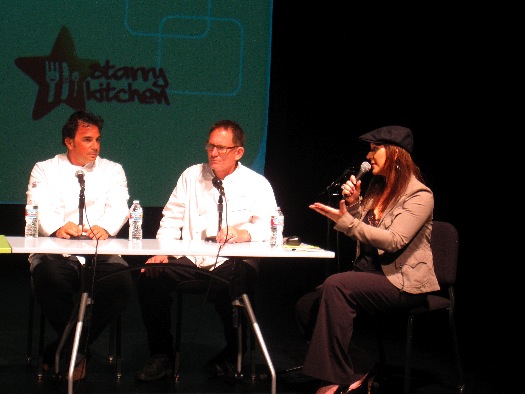On June 8, dineLA hosted a roundtable discussion at REDCAT featuring six of L.A.’s top chefs: Wolfgang Puck, Patina Restaurant Group founder Joachim Splichal, Karen Hatfield (Hatfield’s), Mark Peel (Campanile, The Tar Pit, The Point), Josiah Citrin (Melisse) and Susan Feniger (Border Grill, Ciudad, Street). Lisa Foxx, a radio show host at 104.3MYfm, moderated the discussion, which focused on the mentor/protégé relationship, go-to methodology and cooking at home.
Foxx began by asking chefs about their mentors, and what they learned specifically. As it turned out, a number of panelists had worked together before. Mark Peel started peeling potatoes for Wolfgang Puck at Ma Maison in 1975. Josiah Citrin worked for Puck at Chinois on Main, and for Joachim Splichal at Patina before opening JiRaffe and Mélisse. Feniger also worked for Puck early in her career. From him, she learned, “how to have a restaurant and be in a kitchen where people actually liked each other.”
“Hard work, organization and consistency. That’s the key,” said Peel. “And good ingredients,’ added Puck.
Peel joked that, “Wolfgang and Joachim sprouted from the earth fully grown.” That’s not exactly true, though Splichal was working as a sous chef for legendary French chef Jacques Maxim in his early 20’s. He said that Maxim “taught me what product was all about, went into the field and picked the vegetables.”
Wolfgang Puck described a rockier road to success. At 14, Puck left his home in Austria to work at a hotel, despite his stepfather’s insistence that working as a chef was woman’s work, and that he’d be better off as a mechanic or carpenter. His stepfather told him “you’re good for nothing. You’ll come back in three weeks to the house.” He started apprenticing for a chef at the hotel and was sent home, but he defied the chef and returned to work. He was promptly transferred to one of the hotelier’s different hotels, and found a slightly more welcoming environment. He moved to France and ended up working at a one-star Michelin restaurant, which was fine, until he learned that one-star wasn’t the highest rating.
Puck applied to a slew of 3-star Michelin restaurants and ended up working in Les Baux, for L’Oustau de Baumanière chef-owner Raymond Thuilier, a 73-year-old “Renaissance man” who was also a painter, cookbook author and the town’s mayor. “He was a great mentor but where he stood out was high character,” said Puck.
Hatfield started at Spago and went on to New York, where she was a protégée of Claudia Fleming, who she “considered to be the best pastry chef in New York at the time.” Then it was on to Jean Georges, who taught her “drive, ambition and to be more focused and detail oriented.”

Foxx noted the culinary students in the theater’s front row and asked the established chefs if they had any advice for the aspiring restaurateurs in the audience.
Peel suggested “having an understanding of what they don’t know.” He expanded on the point by noting that prior to opening Campanile with ex-wife Nancy Silverton, he took accounting and legal classes, since those weren’t areas of strength. This went toward the rest of his point: “Recognize your weaknesses and correct them.” Given that, it still took hiring a strong manager to help the restaurant succeed: Manfred Krankl.
“Everything in the restaurant business is about relationships,” said Feniger. “Be incredibly respectful to guests or staff.”
Splichal also discussed the creative side and the business side of the restaurant industry before mentioning his restaurateur prerequisites: “You have to start with caution and passion.”
The discussion inevitably turned to Los Angeles, the city that Puck believes “has the most interesting restaurants in the country.” Peel seemed to think that Angelenos are at an advantage due to the great produce, and credited Puck and chefs like him for establishing relationships with farmers. Peel still remembers a time when Puck purchased baby lambs from a NoCal farmer at Ma Maison. He’s impressed how, in Los Angeles, “The farmers become partners in our cooking rather than just suppliers.”
Foxx asked chefs if they have a “secret weapon” in the kitchen, but Hatfield quickly squashed that notion, saying, “We have good people working for us. We have good equipment. We have good product. There are no tricks.”
Instead of “secret weapons,” chefs like Citrin pointed to tried and true advice, saying, “Morels and asparagus. It’s a great combination. It just so happens that they both grow in the spring.” He said to look to natural partners.
Feniger said she needs three things to make an amazing meal: “salt, acid and tasting” She also said that while product may reign supreme, she learned how to make incredible food in India using simple ingredients. “I think you can make a meal that’s just as amazing from basmati and dal as you can with truffles and foie gras,” she said.
Finally, Foxx asked the chefs what they like to cook at home. Puck considers cappuccino indispensable. Hatfield, a renowned pastry chef, never bakes at home. However, she and husband Quinn do cook, and she usually ends up making pasta. Splichal’s go-to has been fresh tomatoes with vinaigrette and burrata. Feniger chose “great vodka soda with lemons picked from my lemon tree,” followed by marinated artichokes with ribeye, tomatoes, basil and avocado. Citrin and his family “try to cook things in one pot.” Peel said, “I’ve fallen in love with my pressure cooker. He had a “very cheap cut of pork butt” cooking at home during the panel discussion, which he’d seasoned with things like peppers and tomatoes.
After the panel discussion, guests and chefs retreated into the REDCAT lobby, where Nguyen Tran and wife Thi from nearby Starry Kitchen served jap chae, cole slaw, pork belly banh mi and their increasingly notorious green tofu balls.









Leave a Comment